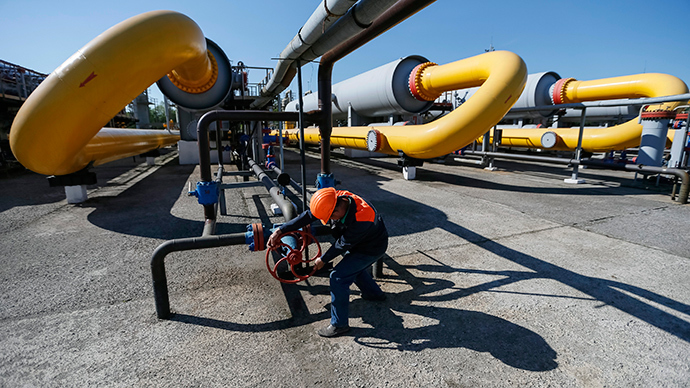Ukraine’s gas: Reversal of fortune?

With Kiev falling somewhat short of the best in class amongst sovereign nations for paying their bills, all manner of cunning plans to secure gas supplies are now emerging.
Somewhere along the line you may have had that unnerving feeling. Perhaps it was producing your wallet in the supermarket and discovering the cash inside was imprecisely correlated to the more extensive contents of the trolley. Or perhaps the household budget didn’t quite match up and hence utility bills loitered around the edge of the mantelpiece simmering with that menace which only a statutory reminder ahead of disconnection can convincingly wield. That the outstanding amount may be $250 is irrelevant – it might as well be $5 billion owed for all the chances you have of paying it.
Of course, if you’re Ukraine then the outstanding gas bill actually is $5 billion, well $4.5 billion to be precise. I am not sufficiently intuitive to discern whether a country owing $5 billion really feels like an individual owing a nano-sliver of this amount, but clearly a lot of the symptoms are similar.
First up there is the denial phase. This Ukraine managed as expertly as any student who had drunk their gas money during Freshers’ Week. It was clearly all Gazprom’s fault for supplying this gas was doubtless a credible line of argument – well at least credible to the Ukrainian government, whose ongoing adherence to good fiscal policy has been as successful as that lifetime of being chaste undertaken by Don Giovanni. As the facade of denial collapses, the creditors typically go through all manner of increasingly emotive appeals. The only difference here appears to be that individuals rarely get their own suite of EU officials to act as intermediaries in the negotiation with the gas board. However, now things have got desperate with matters descending to the sort of sad antics that only usually befall the truly poorest in society, or indeed students whose reputed brainpower appears to elude them when it comes to pragmatic planning.
Having been downgraded to a “pay as you go” plan – that ultimate indignity for all who fail to clear their utility bills on time, Ukraine is now planning to strike back with the oldest trick in the book – tapping into the neighbors’ supply. Frankly this is a bit of a dodgy move when you’re, say, in a slum and desperate but that is at least understandably driven by desperation. When it comes to a sovereign state behaving badly, it’s probably best to have a bit of luck, as stealing enough gas for 45 million people certainly requires the neighbors to be either incapable of reading their meter, or alternatively, compliant with the act.
Tapping into next door’s gas supply remains a significant breach of neighborly etiquette and often rouses the local constabulary to perhaps press charges. When it comes to a whole country planning to get through an Arctic winter by sucking upwards of a billion cubic meters from elsewhere, the whole affair takes on a degree of the heroic bordering on bonkers. Oh, and don’t forget: while the local council will make short work of your gas theft based on a two-page agreement, a cluster of the world’s keenest legal brains have already perused the rafts of Gazprom-Ukraine contracts and oddly enough, it seems highly likely some bright spark solicitor has already written a clause to stop precisely this sort of egregious behavior.
Of course Ukraine actually says it will pay for the gas it gains from its neighbors via pipe tapping – known as “reverse flow” in the trade. However this raises various issues. As noted previously, there is the pure legal angle. Usually, “reverse flow” is expressly forbidden by legal contracts. Then there is also the tiny issue of credit. Do the generally law-abiding taxpayers of, say, Germany really feel comfortable about providing gas free (under terms at best deemed dodgy, by the legal experts, if not outright verboten) to a government whose record has been somewhat patchy about paying its utility bills during the past decade? Then again there is also the fact that the pipes themselves, having been built to supply gas from Russia heading west, may not actually have the specification to permit sufficient flow in the opposite direction. In which case Ukraine might just syphon off supplies intended for the good citizens of the EU, as it has apparently done in the past during previous arguments over payments in 2006 and 2009.
Or it could just pay the outstanding bill.
The statements, views and opinions expressed in this column are solely those of the author and do not necessarily represent those of RT.
The statements, views and opinions expressed in this column are solely those of the author and do not necessarily represent those of RT.













